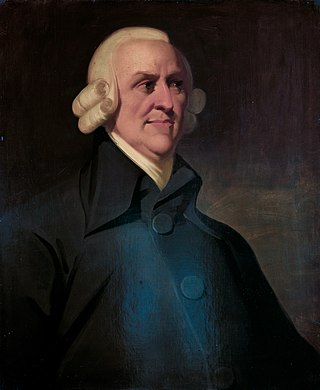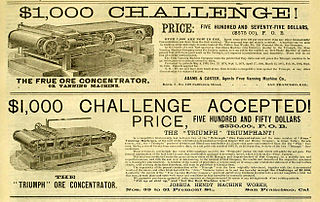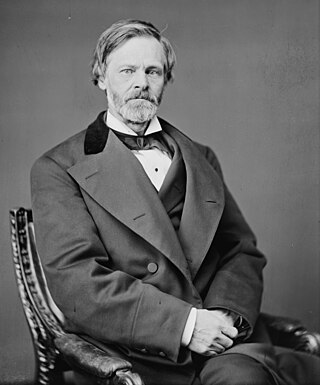In economics, a free market is an economic system in which the prices of goods and services are determined by supply and demand expressed by sellers and buyers. Such markets, as modeled, operate without the intervention of government or any other external authority. Proponents of the free market as a normative ideal contrast it with a regulated market, in which a government intervenes in supply and demand by means of various methods such as taxes or regulations. In an idealized free market economy, prices for goods and services are set solely by the bids and offers of the participants.
A monopoly, as described by Irving Fisher, is a market with the "absence of competition", creating a situation where a specific person or enterprise is the only supplier of a particular thing. This contrasts with a monopsony which relates to a single entity's control of a market to purchase a good or service, and with oligopoly and duopoly which consists of a few sellers dominating a market. Monopolies are thus characterized by a lack of economic competition to produce the good or service, a lack of viable substitute goods, and the possibility of a high monopoly price well above the seller's marginal cost that leads to a high monopoly profit. The verb monopolise or monopolize refers to the process by which a company gains the ability to raise prices or exclude competitors. In economics, a monopoly is a single seller. In law, a monopoly is a business entity that has significant market power, that is, the power to charge overly high prices, which is associated with a decrease in social surplus. Although monopolies may be big businesses, size is not a characteristic of a monopoly. A small business may still have the power to raise prices in a small industry.

Monopolistic competition is a type of imperfect competition such that there are many producers competing against each other, but selling products that are differentiated from one another and hence are not perfect substitutes. In monopolistic competition, a company takes the prices charged by its rivals as given and ignores the impact of its own prices on the prices of other companies. If this happens in the presence of a coercive government, monopolistic competition will fall into government-granted monopoly. Unlike perfect competition, the company maintains spare capacity. Models of monopolistic competition are often used to model industries. Textbook examples of industries with market structures similar to monopolistic competition include restaurants, cereals, clothing, shoes, and service industries in large cities. The "founding father" of the theory of monopolistic competition is Edward Hastings Chamberlin, who wrote a pioneering book on the subject, Theory of Monopolistic Competition (1933). Joan Robinson published a book The Economics of Imperfect Competition with a comparable theme of distinguishing perfect from imperfect competition. Further work on monopolistic competition was undertaken by Dixit and Stiglitz who created the Dixit-Stiglitz model which has proved applicable used in the sub fields of international trade theory, macroeconomics and economic geography.

In the United States, antitrust law is a collection of mostly federal laws that regulate the conduct and organization of businesses to promote competition and prevent unjustified monopolies. The three main U.S. antitrust statutes are the Sherman Act of 1890, the Clayton Act of 1914, and the Federal Trade Commission Act of 1914. These acts serve three major functions. First, Section 1 of the Sherman Act prohibits price fixing and the operation of cartels, and prohibits other collusive practices that unreasonably restrain trade. Second, Section 7 of the Clayton Act restricts the mergers and acquisitions of organizations that may substantially lessen competition or tend to create a monopoly. Third, Section 2 of the Sherman Act prohibits monopolization.

A public utility company is an organization that maintains the infrastructure for a public service. Public utilities are subject to forms of public control and regulation ranging from local community-based groups to statewide government monopolies.

The Toronto Stock Exchange is a stock exchange located in Toronto, Ontario, Canada. It is the 10th largest exchange in the world and the third largest in North America based on market capitalization. Based in the EY Tower in Toronto's Financial District, the TSX is a wholly owned subsidiary of the TMX Group for the trading of senior equities.
In economics, market power refers to the ability of a firm to influence the price at which it sells a product or service by manipulating either the supply or demand of the product or service to increase economic profit. In other words, market power occurs if a firm does not face a perfectly elastic demand curve and can set its price (P) above marginal cost (MC) without losing revenue. This indicates that the magnitude of market power is associated with the gap between P and MC at a firm's profit maximising level of output. Such propensities contradict perfectly competitive markets, where market participants have no market power, P = MC and firms earn zero economic profit. Market participants in perfectly competitive markets are consequently referred to as 'price takers', whereas market participants that exhibit market power are referred to as 'price makers' or 'price setters'.
In economics, a government monopoly or public monopoly is a form of coercive monopoly in which a government agency or government corporation is the sole provider of a particular good or service and competition is prohibited by law. It is a monopoly created, owned, and operated by the government. It is usually distinguished from a government-granted monopoly, where the government grants a monopoly to a private individual or company.

Market structure, in economics, depicts how firms are differentiated and categorised based on the types of goods they sell (homogeneous/heterogeneous) and how their operations are affected by external factors and elements. Market structure makes it easier to understand the characteristics of diverse markets.

In economics, competition is a scenario where different economic firms are in contention to obtain goods that are limited by varying the elements of the marketing mix: price, product, promotion and place. In classical economic thought, competition causes commercial firms to develop new products, services and technologies, which would give consumers greater selection and better products. The greater the selection of a good is in the market, prices are typically lower for the products, compared to what the price would be if there was no competition (monopoly) or little competition (oligopoly).

The Panic of 1910–1911 was a minor economic depression that followed the enforcement of the Sherman Antitrust Act, which regulates the competition among enterprises, trying to avoid monopolies and, generally speaking, a failure of the market itself. The short-term panic lasted approximately 1 year and led to a drop of the major U.S. stock market index by ~26%. It mostly affected the stock market and business traders who were smarting from the activities of trust busters, especially with the breakup of the Standard Oil Company and the American Tobacco company.
A regulated market (RM) or coordinated market is an idealized system where the government or other organizations oversee the market, control the forces of supply and demand, and to some extent regulate the market actions. This can include tasks such as determining who is allowed to enter the market and/or what prices may be charged. The majority of financial markets such as stock exchanges are regulated, whereas over-the-counter markets are usually not at all or only moderately regulated.
In United States antitrust law, monopolization is illegal monopoly behavior. The main categories of prohibited behavior include exclusive dealing, price discrimination, refusing to supply an essential facility, product tying and predatory pricing. Monopolization is a federal crime under Section 2 of the Sherman Antitrust Act of 1890. It has a specific legal meaning, which is parallel to the "abuse" of a dominant position in EU competition law, under TFEU article 102. Section 2 of the Sherman Act states that any person "who shall monopolize. .. any part of the trade or commerce among the several states, or with foreign nations shall be deemed guilty of a felony." Section 2 also forbids "attempts to monopolize" and "conspiracies to monopolize". Generally this means that corporations may not act in ways that have been identified as contrary to precedent cases.
A legal monopoly, statutory monopoly, or de jure monopoly is a monopoly that is protected by law from competition. A statutory monopoly may take the form of a government monopoly where the state owns the particular means of production or government-granted monopoly where a private interest is protected from competition such as being granted exclusive rights to offer a particular service in a specific region while agreeing to have their policies and prices regulated. This type of monopoly is usually contrasted with de facto monopoly which is a broad category for monopolies that are not created by government.
Original meaning of the word Monopoly comes from Greek as a compound of two words “mono,” which means “single” or “one,” and “polein“, meaning “ to sell.“ This word was perceived as an exclusive legal right of sale covered by Government usually ensured by patent or licence. In the seventeenth century was monopoly defined by sir Edward Coke as “allowance by the King to any person or corporate for the sole buying, selling, making, working or using anything, whereby any person or corporate are sought to be restrained of any freedom or liberty that they had before.” In the eighteenth century was developed another definition by Samuel Johnson as “exclusive privilege of selling anything.” In the course of time has monopoly become interpreted as a private accumulation of economic power or an entity that has total or near-total control of a market.

Televerket was a Swedish State authority acting as a state-owned corporation, responsible for telecommunications in Sweden from 1853 until 1993. Originally it was named Kongl. Elektriska Telegraf-Werket, which was founded in 1853. Its name changed to Kongl. Telegrafverket in 1871, Kungl. Telegrafverket in 1903, the prefix Kungl. was dropped in 1946 and the name was further modernised to Televerket in 1953. Televerket continued on with its telecommunications monopoly until corporatisation in 1993, when it was renamed Telia, now part of Telia Company.

Hoarding in economics refers to the concept of purchasing and storing a large amount of product belonging to a particular market, creating scarcity of that product, and ultimately driving the price of that product up. Commonly hoarded products include assets such as money, gold and public securities, as well as vital goods such as fuel and medicine. Consumers are primarily hoarding resources so that they can maintain their current consumption rate in the event of a shortage. Hoarding resources can prevent or slow products or commodities from traveling through the economy. Subsequently, this may lead to the product or commodity to becomes scarce, causing the value of the resource to rise.

The Federal Antimonopoly Service of Russia (FAS) is the federal-level executive governmental organ that controls the execution of the antitrust law and related areas.
Space launch market competition is the manifestation of market forces in the launch service provider business. In particular it is the trend of competitive dynamics among payload transport capabilities at diverse prices having a greater influence on launch purchasing than the traditional political considerations of country of manufacture or the national entity using, regulating or licensing the launch service.









